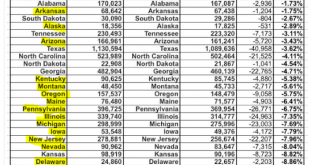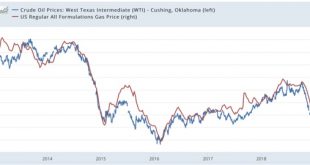In The New York Times Abby Goodnough wrote” she got a Vivitrol (naltrexone) shot but it was so expensive — her co-payment was $600 — that she never got another” !!! This is insane. Naltrexone is an opioid antagonist. It prevents opioids from causing a high (and relieving pain and suppressing coughing and breathing). In no way is it conceivably a drug of abuse. But opioid addicts who wish to cut off all effects of opioids have to pay for their...
Read More »ACA Enrollment for 2019
To add to Robert Waldman’s post on ACA enrollment, here is the chart as taken from Andrew Sprung’s Blog (Expostfactoid) on the ACA. This is data Charles Gaba had gathered and Andrew rearranged. Note non-expansion Medicaid states did better than expansion states in enrollment. Why is that true? The states marked in yellow on the left are expansion states. Without getting into the data and explaining Andrew’s findings, it is interesting the difference in...
Read More »Twelve Dimensional Chess
Barack Obama just won Gallup’s man most admired by US adults poll for the 11th straight time. Also, in spite of the Republicans’ determined efforts including elimination of the mandate, Healthcare.gov signups are only 4% fewer than last year’s. Finally, I am thinking about “eleven dimensional chess”. This was a joke about Obama and Obamaniacs who ascribed his amazing luck to brilliantly subtle strategy. To be honest I was thinking of Hillary Clinton...
Read More »Taxes Up 30%!
Taxes Up 30%! A couple of months ago yours truly complained a bit about some fiscal dishonesty coming from Team Trump: He was basically lying to us hoping the public would be too stupid to realize that when the price level rose by 2.5% during the same period, we are talking about a 2% real decrease in tax revenues. But if we look at customs duties we do see an increase in a category that represents a very modest part of Federal tax collections. Back in...
Read More »Open thread Dec 27, 2018
Could an Oil Patch decline turn a 2019 slowdown into an outright recession?
Could an Oil Patch decline turn a 2019 slowdown into an outright recession? One of the items I mentioned in my piece yesterday at Seeking Alpha was the recent big decline in oil prices. Please go read the piece, it puts a couple of pennies in my pocket! But in that article I referenced the decline in industrial production that was caused by the 2014-15 decline in gas prices. I wanted to follow up a little here. In 2014 into early 2015, Oil prices...
Read More »Merry Christmas
Back down from the mountains where it was snowing yesterday, a silent beauty. Sitting in my daughter’s kitchen drinking a cup of Keurig manufactured coffee. The household is quiet as I think about the events of the last months and attempt to pen a few words. Washington is still shut down and one man pouts. Thousands of people suffer the impact of a hurricane in Puerto Rico, floods in the South, and wild fires in California due to our impact upon the...
Read More »On the Front Lines of Climate Change: Old White Homeowners, Many of them Upper Class
On the Front Lines of Climate Change: Old White Homeowners, Many of them Upper Class The other night I was sitting at home, locked in a conversation about climate change and race. How is this a racial issue, I asked? I realize that the society I live in has pervasive racism, and one should always keep this in mind, but how specifically is climate change worse for nonwhites? Well, it’s all about first and worst impacts, I was told. People of color are...
Read More »Paul Ryan wouldn’t recognize a free market if one bit him
(Dan here…lifted from Robert’s Stochastic Thoughts) Paul Ryan wouldn’t recognize a free market if one bit him Robert Costa and Mike DeBonis wrote an excellent retrospective on the career of Paul Ryan‘He was the future of the party’: Ryan’s farewell triggers debate about his legacy They are quite harsh, but not, I think, quite harsh enough. My comment: This is an excellent article. Tough but fair with no sugar coating but also no discourtesy. However,...
Read More »The Fed scrapes Scylla after careening into Charybdis
by New Deal democrat The Fed scrapes Scylla after careening into Charybdis In the past several years, I have described the Fed as trying to steer in between the Scylla of a yield curve inversion and the Charybdis of higher rates wounding the housing market.Recently several trends have reversed. This offers some relief to housing, but more risks to the economy as a whole. This post is Up at Seeking Alpha. By the way, several times yesterday and today, the...
Read More » The Angry Bear
The Angry Bear


